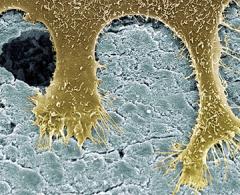
This Article From Issue
September-October 2005
Volume 93, Number 5
Page 412
DOI: 10.1511/2005.55.412
Beginning this issue, Science Observer presents a brief roundup of notable recent items about scientific research culled from news reports.
Titan Volcano May Be Source of Methane in the Moon's Atmosphere
As much as three percent of the smoggy atmosphere of Saturn's moon Titan is made up of methane. Having any atmosphere at all makes Titan unique among moons, but scientists have been particularly puzzled over the presence of methane. A recent image snapped by the Cassini spacecraft hints at an answer. The image shows a circular topographical figure with two wings jutting out from it. The feature in the image looks much like volcanoes viewed on Earth and Venus, so the researchers posit that this ring on Titan is a volcano some 19 miles in diameter, and its wings are flows of ice and methane. A pool below the surface probably supplies the methane.
Sotin, C., et al. Release of volatiles from a possible cryovolcano from near-infrared imaging of Titan. Nature 435:786-789 (June 9)
Smells Like Liquid Television: Oxytocin Promotes Human Trust
A nasal spray that washes away protective suspicions sounds too full of insidious potential to be true, but it's not some villainous comic book fantasy. Researchers report that the hormone oxytocin promotes trust among human beings. They extracted the hormone into a nasal spray, and set up an experiment in which subjects were given money to invest. Half of the investors were dosed with the oxytocin spray; half were not. The result: Those exposed were twice as likely to risk all of their money with strangers, and in the end had invested 17 percent more of their money than the control subjects. However, their inhibitions dropped only in face-to-face encounters.
Kosfeld, M. et al. Oxytocin increases trust in humans, Nature 435:673-676 (June 2).
New Evidence Revives Old Debate over California's Ancient Visitors
Did ancient Polynesians visit Southern California between 500 and 700 A.D.? A controversial new study in the journal American Antiquity suggests that the answer is yes. The paper bases its conclusions on two strands of theory: Revised carbon dating of an ancient ceremonial headdress suggests that Southern California's Chumash Indians were fishing deep-sea waters at about the same time as the Polynesians, and the Chumash word for "sewn-plank canoe" is similar to the Polynesian term for redwoods, which they used to make a similar type of canoe. The contention reawakens the "transpacific diffusion" hypothesis, which holds that Pacific Islanders and Asians may have visited ancient North America—an idea that fell out of anthropological favor in the 20th century.
Klar, K. A., and T. L. Jones. Diffusionism reconsidered: linguistic and archaeological evidence for prehistoric Polynesian contact with Southern California. American Antiquity 70:457-484 (July).
Readings Released from Sumatran Quake
The marriage of highly sensitive technologies with data on the devastating energy released by last December's Sumatra-Andaman earthquake and tsunami has produced a stunning, comprehensive view of the geological event. Some facts: The event created the longest fault rupture ever observed, tearing an 800-mile gash in the earth's crust. The quake also released energy equal to the explosion of 100 billion tons of TNT. All that energy caused oscillations sensed by seismographs around the world.
Lay, T., et al. The great Sumatran-Andaman earthquake of 26 December 2004. Science 308:1127-1133 (May 20).
Honeybee's Waggle Dance an Elaborate Communication
Most biologists believe the famed waggle dance of the honeybee constitutes coded language that directs other bees to nectar and pollen. The insight won Karl von Frisch a Nobel Prize in 1973. It also sparked dissent: The dance is just a meaningless paroxysm brought on by the scent of food, others said. A recent study used radio transponders to track honeybees and determine flight paths, then collapsed them into hard data that finally tied the dance to language. Sure enough, after the bees seemed to confer about sweet but scent-free sucrose stocked at the far end of an isolated German meadow, those recruited by the dance-language flew to the source, even calculating for wind drift.
Riley, J. R., et al. The flight paths of honeybees recruited by the waggle dance. Nature 435:205-207 (May 12).
Sunlight Trips the Eye Fantastically
"Nothing is as it appears to be." The axiom can be applied to our perception of the sky, which is influenced by a mix of atmospheric physics and our own physiology. While passing through the Earth's atmosphere, sunlight scatters off oxygen and nitrogen molecules in the air. The light with the shortest wavelengths moves around the most, so blue abounds. But that's only half the story. Other colors are there, too—at least as much violet light, in fact, as blue. So why is the sky blue and not purple? Each time we look up at the sky, the spectrum of colors represented tweaks the circuitry inside our eyes, causing us to detect instead a mixture of pure white light and pure blue.
Smith, G. Human color vision and the unsaturated blue color of the daytime sky. American Journal of Physics 73:590-597 (July).

American Scientist Comments and Discussion
To discuss our articles or comment on them, please share them and tag American Scientist on social media platforms. Here are links to our profiles on Twitter, Facebook, and LinkedIn.
If we re-share your post, we will moderate comments/discussion following our comments policy.